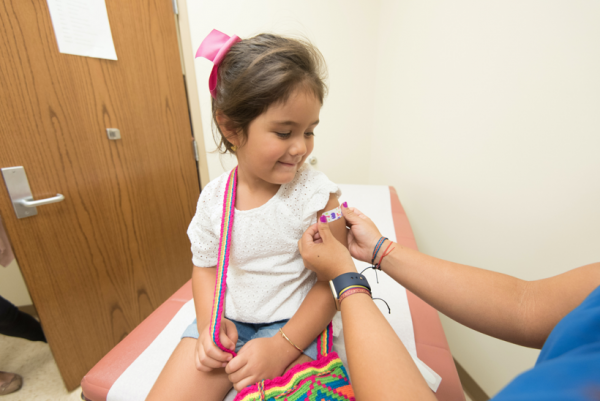
Test your knowledge about kid’s health
Test your knowledge about kid’s health
- Parents should start cleaning their child’s teeth as soon as the first tooth appears.
True
False
2. Children younger than 6 years should use enough toothpaste with fluoride to cover the toothbrush.
True
False
3. A parent or other family member’s attitude about tobacco influences a teen’s likelihood to try tobacco products.
True
False
4. Less than 25% of all rapes of females occur before age 18.
True
False
5. Birth defects are the leading cause of death in children and adolescents.
True
False
6. Vaccines protect children against nine potentially serious diseases.
True
False
7. Kids should wash their hands vigorously together for 20 seconds to remove germs.
True
False
8. For babies under 6 months of age, sunscreen is the best defense against sunburn.
True
False
9. Children should get at least 20 to 30 minutes of physical activity on all or most days of the week.
True
False
10. By the age of 20, the average woman has acquired most of her skeletal mass.
True
False
Question 1 – Parents should start cleaning their child’s teeth as soon as the first tooth appears.
True: Start cleaning as soon as the first tooth appears. Wipe teeth every day with a clean, damp cloth. Switch to a small, soft toothbrush as more teeth come in.
Question 2 – Children younger than 6 years should use enough toothpaste with fluoride to cover the toothbrush.
False : Young children should use only a pea-sized amount of fluoride toothpaste. Fluoride is important for fighting cavities, but if children younger than 6 years swallow too much fluoride, their permanent teeth may have white spots.
Question 3 – A parent or other family member’s attitude about tobacco influences a teen’s likelihood to try tobacco products.
True : Research suggests that parental attitude is very important. If a parent is indifferent or permissive toward the issue of tobacco use, a teenager’s likelihood of smoking increases. The value a parent places on a tobacco-free lifestyle—regardless of whether a parent uses tobacco—carries significant weight.
Question 4 – Less than 25% of all rapes of females occur before age 18.
False : More than half (54%) of all rapes of females occur before age 18; of those, 22% occur before age 12.
Question 5 – Birth defects are the leading cause of death in children and adolescents.
False : In the United States, injuries are the leading cause of death and disability for people aged 1 to 44 years. Most deaths among children and adolescents aged 5-19 years are from the following injury-related causes: motor vehicle crashes, all other unintentional injuries, homicide, and suicide. Highly associated with these injuries are certain adolescent behaviors, such as physical fights, carrying weapons, and not using seatbelts.
Question 6 – Vaccines protect children against nine potentially serious diseases.
False : Vaccines protect against 12 potentially serious diseases: measles, mumps, rubella (German measles), diphtheria, tetanus (lockjaw), pertussis (whooping cough), polio, Haemophilus influenzae type b (Hib disease), hepatitis B, varicella (chickenpox), hepatitis A, and pneumococcal disease. At least one shot is needed for each of these diseases, and for some of them several doses are required for the best protection.
Question 7 – Kids should wash their hands vigorously together for 20 seconds to remove germs.
True : By the way, it’s not just for kids. Everyone should wash their hands for 20 seconds (or about the length of a little tune) to remove germs. It is the soap combined with the scrubbing action that helps dislodge and remove germs.
Question 8 – For babies under 6 months of age, sunscreen is the best defense against sunburn.
False.
Your baby’s best defense against sunburn is avoiding the sun or staying in the shade. However, according to the American Academy of Pediatrics sunscreen use on babies less than 6 months old is not harmful on small areas of a baby’s skin, such as the face and back of the hands.
Question 9 – Children should get at least 20 to 30 minutes of physical activity on all or most days of the week.
False : It is recommended that children and adolescents participate in at least 60 minutes of moderate intensity physical activity most, preferably all, days of the week.
Question 10 – By the age of 20, the average woman has acquired most of her skeletal mass.
True : By the age of 20, the average woman has acquired most of her skeletal mass. It is important for young girls to reach their peak bone mass in order to maintain bone health throughout life. A person with high bone mass as a young adult will be more likely to have a higher bone mass later in life. Not getting enough calcium or exercise early on could result in a failure to achieve peak bone mass in adulthood.
See more here : https://www.cdc.gov/
Author: Sumana Rao | Posted on: February 21, 2018
« Teach your Toddler to talk Parents learn how to prevent heat related illness »






















Write a comment